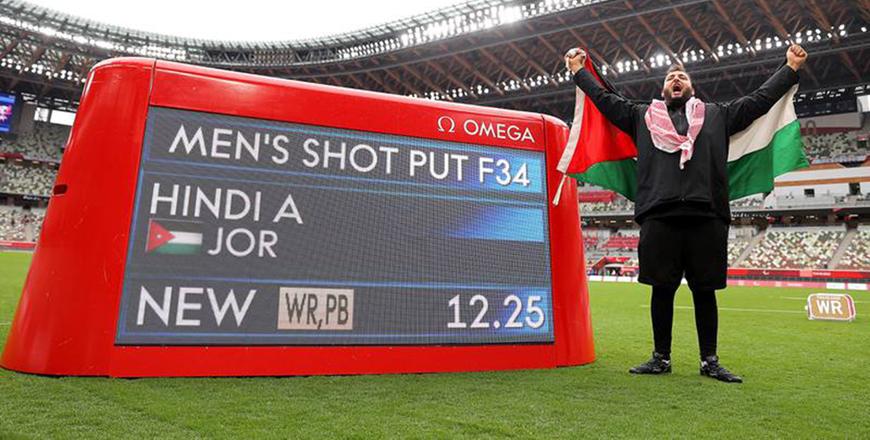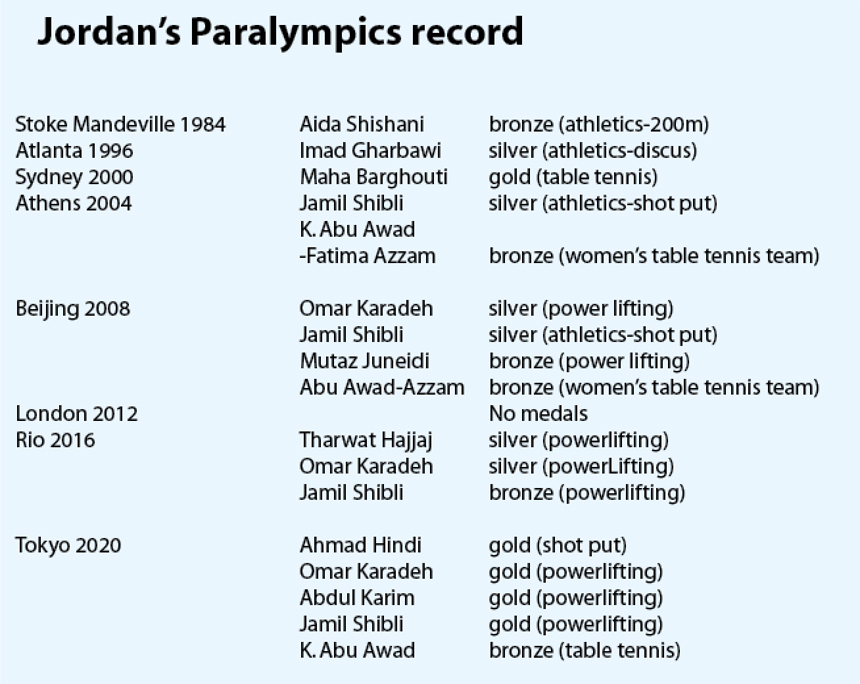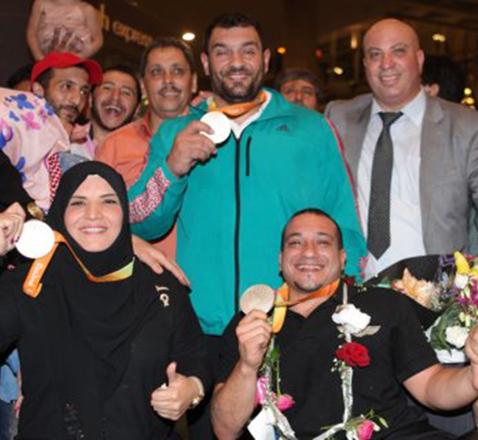You are here
Jordan Paralympians return with 5 medals, including historic 4 golds, world record
By Aline Bannayan - Sep 04,2021 - Last updated at Sep 04,2021

Jordan’s Ahmad Hindi celebrates winning the gold medal and breaking the world record in the men’s shot put F34 final at the 2020 Tokyo Paralympic Games on Saturday (AFP photo)
AMMAN — The Jordanian delegation to the 2020 Tokyo Paralympic Games ended participation on a high note winning a historic fourth gold medal in the shot put on Saturday and fifth overall medal at the Games.
Ahmad Hindi capped the historic participation setting a new world record and adding a gold on the athletics fields to three previous golds in power lifting by Omar Karadeh (49kg category), Abdul Karim Khattab (88kg), and Jamil Shibli (+107 kg). A fifth medal was secured by veteran table tennis star Khitam Abu Awad’s bronze in wheelchair table tennis.
It was the first time that Jordan won a total of five medals at a single games including an impressive four gold medals after Maha Barghouti’s sole gold at the 2000 Sydney Games.
Since 1984, Jordan has now won a total of 17 medals at the Paralympics (five gold, 6 silver and 6 bronze). This edition, Jordan had qualified 10 athletes in three events: Table tennis, athletics, and weightlifting. The delegation included Hindi in athletics, Beijing and Athens bronze medallist veteran Khitam Abu Awad and Faten Oleimat in table tennis and seven athletes in power lifting: Athens and Beijing silver medallist and Rio bronze medallist Jamil Shibli, Rio silver medallist Omar Karadeh, Beijing bronze medallist Mutaz Juneidi, Rio silver medallist Tharwat Hajjaj, Mohammad Tarbash, Abdul Karim Khattab and Asma Issa.
Coming back home with medals has been the norm for athletes with disabilities who have usually made up for the failure to achieve better results on the Olympic scene, where even qualifying to the world’s premier sports gathering has been a daunting task, and since first participating in 1980, the Kingdom was yet to earn an Olympic medal up until 2016.
Since the 1980 Moscow Olympics, Jordan first won gold when Barghouti won a gold medal at the Sydney Paralympics in 2000 (wheelchair table tennis) and then at the 2016 Rio Olympics by Ahmad Abu Ghaush (taekwondo’s 68 kg category). At this year’s Tokyo Games, two medals were won as Jordan’s Saleh Sharabati grabbed a silver (taekwondo — 80kg category), while a second medal, a bronze, was secured by Abdul Rahman Masatfeh (-67 kg category) as Karate made its debut as an Olympic sport.
A look back at past participations demonstrates how sports for the disabled has gained recognition for Jordan through impressive performances on the international scene. Jordan’s medals tally started in 1984, when the late Aida Shishani won bronze in athletics, 200m. At the 1996 Atlanta Paralympics, Imad Gharbawi won a silver medal in the discus. Barghouti won gold in Sydney 2000. Two medals were added in Athens 2004 when Shibli won silver in the shot put while the women’s table tennis team (Abu Awad and Fatima Azzam) won bronze. (Abu Awad later on won silver at the 2006 World Championship).
In 2008, Jordan’s athletes competed in table tennis, powerlifting and athletics and ended competition with a record four medals, two silvers and two bronze. Omar Karadeh took silver in power lifting; Shibli, a silver medallist in Athens 2004, added a second silver with a new Paralympic world record in the shot put, Juneidi won a bronze medal in power-lifting and the women’s wheelchair table tennis team won bronze when Fatima Azzam and Khitam Abu Awad repeated their bronze medal win in Athens 2004.
The 2012 Paralympics was the most disappointing participation after the usual winners in table tennis failed to advance past the round of 16 while power lifters were embroiled in controversy amid assault complaints and were returned home.
In Rio 2016, Jordan won three medals in powerlifting (two silvers by Tharwat Hajjaj (86kg category) and Omar Karadeh (49 kg category), while 2004 and 2008 silver medallist Shibli won bronze (+107 kg category).
Paralympic athletes are grouped in classes defined by the degree of function presented by the disability. Traditionally there are athletes who belong to six different disability groups in the Paralympics Movement: amputee, cerebral palsy, visual impairment, spinal cord injuries, intellectual disability and a group which includes all those who are not within the aforementioned groups.

Related Articles
AMMAN — The Tokyo Paralympic Games will provide more Jordanian athletes with a chance to get on the podium, break records and compete alongs
AMMAN — The biggest sporting gatherings in the world have come to an end as the Summer Olympic Games as well as the Paralympic Games conclud
AMMAN — Jordan joined nations from around the world as the Paralympic Games started in Paris on Wednesday
















